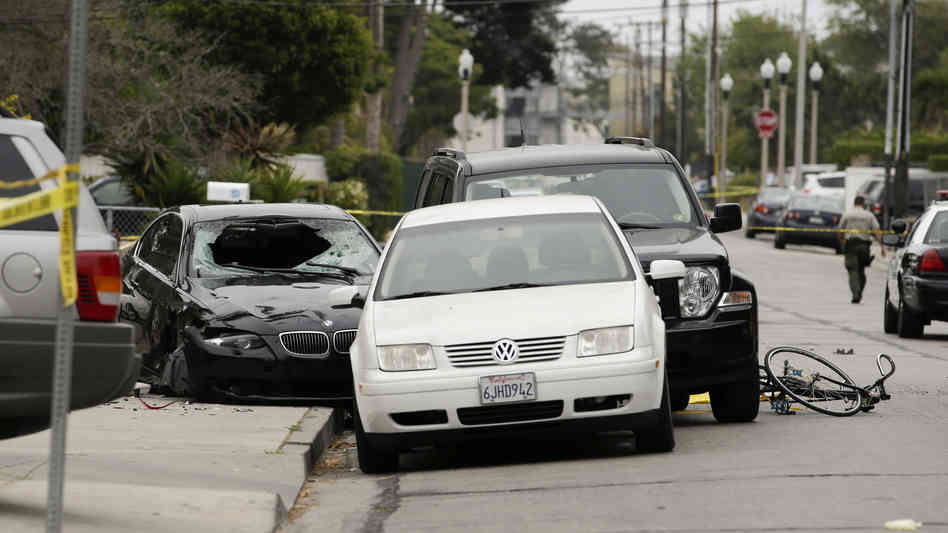
On Friday evening in the residential neighbourhood of Isla Vista in Santa Barbara, California, 22-year-old Elliot Rodger stabbed his three young Asian American housemates – George Chen, 19 , Weihan “David” Wang, 20, and Chen Yuan “James” Hong, 20 – to death while they slept. Rodger then drove his luxury BMW coupe to the Alpha Phi sorority where he opened fire with two legally purchased handguns on three female passersby; two – Katherine Cooper, 22 and Veronica Weiss, 19 – were killed, while a third is recovering in hospital. Rodger proceeded to the nearby I.V. Deli Mart and fired randomly into the store, killing Christopher Michael-Martinez, 20. He then drove through the streets of Isla Vista, shooting randomly at pedestrians and striking two cyclists with his car; by the end of the night, he had wounded 13. A brief firefight ensued between him and sheriff deputies, which ended when Rodger crashed his car into another vehicle. Rodger was found dead in the drivers’ seat of an apparent self-inflicted gunshot wound to the head.
By Saturday, several YouTube videos created by Rodger – including one uploaded just hours before the attack that appeared to offer a motive for the deadly shooting – were discovered, along with a 140-page autobiography-turned-hate-fueled-manifesto. These items, along with Rodger’s frequent posts on BodyBuilding.com and PUAHate.com forum boards paint a disturbing – and disturbingly detailed – portrait of a narcissistic, mentally disturbed, lonely, woman-hating man-child so deeply twisted by American racism, classism, and sexism that he found a way to rationalize mass murder. Sparked by an abundance of macabre primary source material, over two hundred thousand news articles and think-pieces have now been written about Rodger (according to Google’s latest count) and the feminist hashtag #YesAllWomen – initiated in response to Rodger’s documented misogynistic motives – remains one of the top 5 trending topics on Twitter.
I have over the last four days stayed silent on the UCSB shooting as I tried to parse my own thoughts on Friday’s violent attack. I watched some of the YouTube videos and read Rodger’s manifesto.
In the end, I couldn’t shake the same chilling reaction I felt when I first read about Friday night’s violence: I had seen Elliot Rodger’s brand of radical hatred before. I had seen it within the comments section of my own site for a decade. I had seen it from members of my own community.
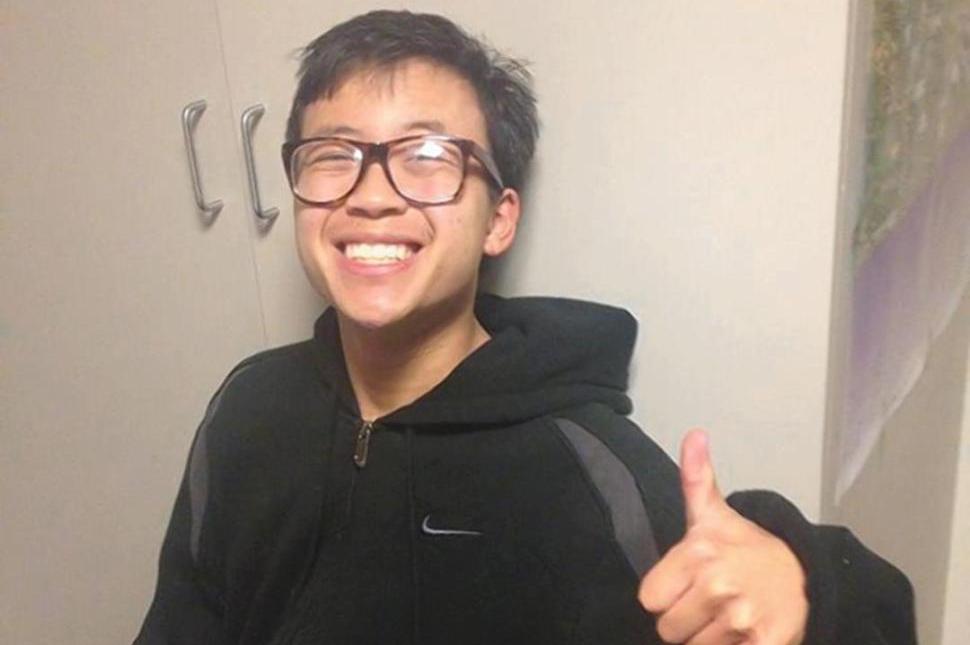
A Toxic Concoction of Racism, Classism and Sexism
Elliot Rodger had internalized a toxic concoction of America’s white supremacy, its rape culture, and its entitlement complex. To read his manifesto is to discover that Rodger’s underlying disease was a pathological yearning for social acceptance; branching out of this central obsession, however, were ideas warped by racism, classism and sexism. Rodger wanted nothing more than to be “cool”, a word he defined as synonymous with wealth, Whiteness, and straight masculinity. Rodger’s manifesto documents a life in pursuit of this twisted ideal, and a radicalized hatred for every internal and external deviation from it.
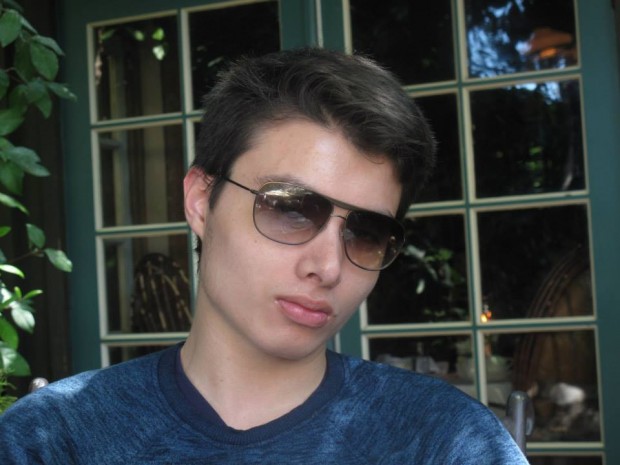
Elliot Rodger enjoyed the economic privilege that came with being born into an upper-class family. He despised all indicators of poverty, routinely calling people he disliked “low-class scum” (a descriptor he also used for other people of colour). This only fueled his rage that he was denied the social acceptance he believed others with less wealth enjoyed. Yet, Rodger’s family routinely encountered financial trouble which periodically limited access to the luxuries Rodger felt he was entitled to; consequently he reveled in these moments – flying first class, attending movie premieres, eating at posh buffets – when they were sparingly available, and coveted them when they were not. In the final years of his life, Rodger spent thousands of dollars on Powerball tickets, thinking the multi-million dollar jackpot would help him purchase social acceptance and superiority. Ironically, in death, Rodger has been re-cast by mainstream news as the wealthy elitist he so yearned to be.
Elliot Rodger was also a biracial Asian American – a fact almost completely lost in mainstream coverage of this incident. He self-identified as a “beautiful Eurasian”, an identity that he believed elevated him above “full-blooded Asians”, but that he believed also hindered social and sexual acceptance by his White peers. Rodger’s fetishization of Whiteness manifests throughout his life: he bleaches his hair blonde and pursues only blonde White women. Rodger’s biracial identity clearly contributed to his feeling of social ostracism. Ironically, in death, his race has been completely White-washed.
But above all, Elliot Rodger believed himself to be a “magnificent gentleman”. He believed that society’s greatest “injustice” was its failure to accept him as the masculine ideal. Elliot Rodger believed he needed, and was entitled to, a “beautiful blonde girlfriend” to have sex with, and that his possession (for indeed, that is how he saw it) of such a woman would confer true manhood. He was enraged and embittered by his perception that the world willfully and repeatedly conspired to deny him – and him alone – access to sex. He believed the world had emasculated him, because at 22 years old, he was still a virgin.
That is, and pardon my French, utter bullshit.
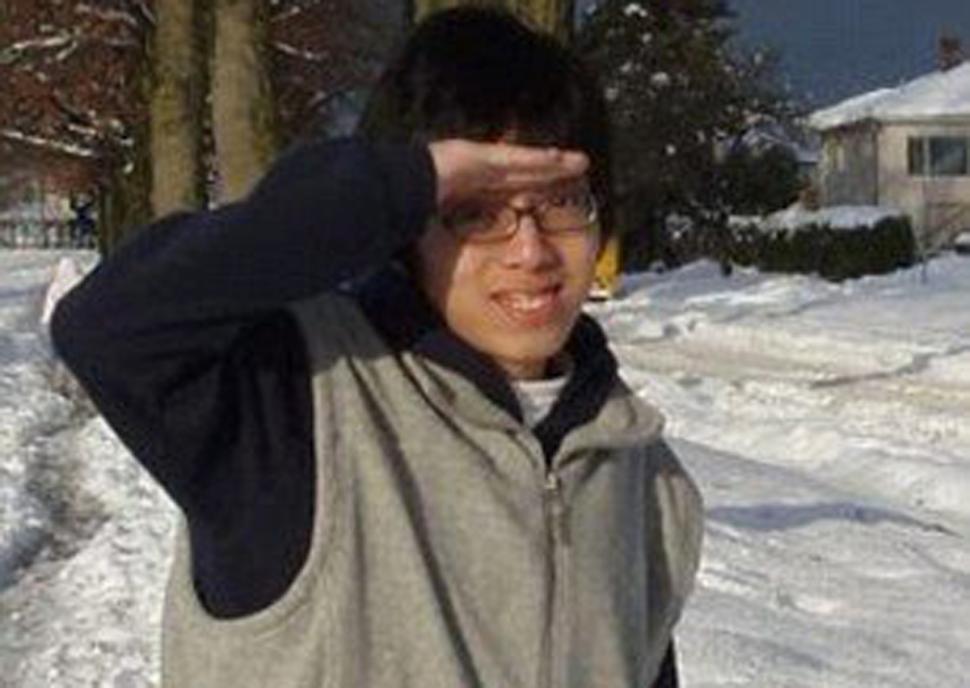
Masculinity and the Asian American Community
Questions of masculinity resonate in the Asian American community. For Asian American men, their stereotypical emasculation deeply impacts self-conception. For some, the uplift of Asian American male gender and sexual identity is among the most critical political priorities for Asian Americans. Most Asian American activists – myself included – embrace efforts to redefine Asian American masculinity as part of a holistic approach to challenging anti-Asian stereotypes. Yet, rarely does our community dissect what we mean when we talk about masculinity, and the tactics that we take to empower Asian American men in reclamation of it.
For Elliot Rodger, masculinity was defined primarily through sexual conquest: the degree to which a man successfully woos a woman, and the quality (i.e. beauty) of the woman wooed. Disturbingly, Rodger’s sex-based definition of masculinity was not unique: it is a definition prevalent throughout American popular culture, and one embraced by the Asian American community, too. It is reflected in countless popular culture films (for example, Don Jon), and it is a central tenet of the “seduction community” where it is called the “game”. Pick-up artistry refers to self-help workshops (costing thousands of dollars a session) that purport to teach men the seduction skills to “score” a woman (called “targets”) rating 7 or higher on the program’s standardized beauty scale.
Within the Asian American community, too, we see this sex-based version of masculinity go unchallenged. Too often, we narrowly (and sometimes uncritically) promote pop culture images of Asian American men in sexual or romantic roles (where the character’s explicit heterosexuality alone defines the character as empowering and masculine). Too often, we revere characters like JT Tran, who sells an Asian American-specific version of pick-up artistry workshops, and David Choe, who hosted a popular Asian American-focused podcast that intended to subvert Asian American emasculation through real or manufactured tales of sexual conquest (where he also allegedly confessed to rape).
But let’s be clear: this sex-based masculinity is not actual masculinity. It is something else: let’s call it “misogylinity”.
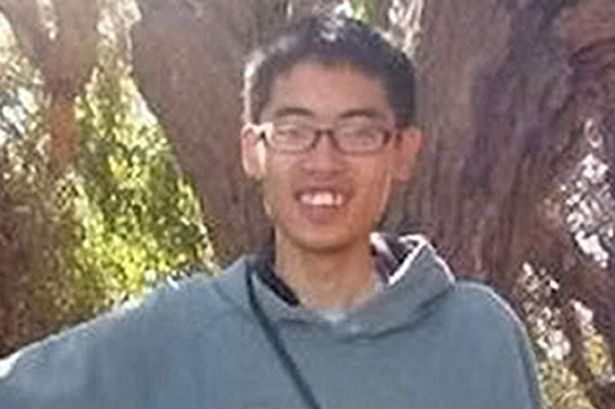
Masculinity vs. “Misogylinity”
Misogylinity (and yes, I did just make up a word) defines masculinity by the objectified ownership of female sexuality, and in so doing commodifies us as tokens for the purposes of keeping masculine score. Furthermore, misogylinity is distinctly racist: for Elliot Rodger, mainstream America, and even some of Asian America, the sliding scale of female attractiveness posits White women as the pinnacle, and the worth of women of colour progressively decreasing as melanin content increases.
Within the Asian American community, the fight to correct systemic emasculation of our Asian American men is not fringe: it is a mainstream, politicized rationale for our general social justice advocacy. And while this cause is righteous, I can’t help but wonder: have we allowed ourselves to believe that this end justifies any means? Do we sometimes let the fight to reclaim Asian American masculinity rationalize the recreation of systems of oppression against other Asian American identities? Does our unwavering focus on the goal of correcting Asian American emasculation sometimes result in failures to examine how these efforts might also silently reinforce sexism, heterosexism and misogylinity?
Can we be doing better?

Asian America’s Radical “Misogylinists”
At the extreme margins of Asian Americana, misogylinity has taken hold as a thriving sub-culture. Here, some Asian American men have expressed for over a decade a hatred frighteningly similar to that of Elliot Rodger. The parallels are not abstract.
Like Elliot Rodger, these men feel profoundly wronged by their perceived emasculation. Like Elliot Rodger, these men embrace the language of the men’s rights movement, and the misogyny of the seduction community. Like Elliot Rodger, these men bitterly lament their fate as “unintentionally celibate” (Rodger used the phrase “kissless virgin”).
Like Elliot Rodger, these Asian American men believe it to be the duty of women to offer sex to men, in order to boost their partner’s masculinity and sexual desirability; specifically, they believe it the responsibility of Asian American women to personally challenge Asian American emasculation by limiting their sexual choices to Asian American men. Like Elliot Rodger, these men characterize women who refuse to commodify their own sexuality as stupid, sluts, or race traitors (or all of the above), and even promote sexual violence against them.

Like Elliot Rodger, these men anecdotally catalog every witnessed romantic relationship as representative of society’s larger sexual rejection of them. Like Elliot Rodger, these men rate the worth of a woman based predominantly — or exclusively – on her sexuality and her choice in sexual partner. For these Asian American men, specific vitriol is aimed at Asian American women in interracial relationships, which is seen as sufficient indication of internalized racial self-hate (see comments of this post for examples).

Like Elliot Rodger, these men routinely use misogynistic language (i.e. sellout, bitch, cunt, whore, etc) to characterize women.

And like Elliot Rodger, some of these men will even take action, confronting women directly with harassment. But, in addition to your usual online sexism, Asian American female writers also face a specific brand of confrontational and misogynistic harassment. We are forced to endure Asian American men who tweet at us with an uninvited and unrelenting barrage of misogynistic language, the digital equivalent to Rodgers’ serial drink-splashing of local Isla Vista couples in the months leading up to the attack.
They engage in drive-by sexism, to “teach us a lesson”, to shame us for our feminism; significantly, it is also all completely unprovoked. Further, it arrives from members of our own racial communities, attacking not just our identities as women, but also our identification as Asian Americans. Questions of our racial authenticity coming from men who might otherwise be our political allies makes the damage all the worse.

I have blocked no less than five such accounts – all of which tweeted at me daily with a string of misogynistic insults – in the last few months. All of the screen-captures here are from the last month, when I actually started an archive of my own harassment.
Yes, All Women
I do not claim that the behaviour seen here comes from all or even most Asian American men. It’s not all (or even most) Asian American men, and I am thankful for that.
But, I can say with absolute certainty that these men are pervasive enough to have harassed virtually all Asian American women with any degree of prominence over the years, myself included. #YesALLWomen.
I do not claim that all or even most Asian American men – or, all or even most Asian American misogynists – will resort to the kind of heinous violence exemplified by Elliot Rodger. Elliot Rodger wanted to outlaw sex, put women in concentration camps and starve us to death, and to rule the world as a tyrannical despot. What made Elliot Rodger a killer was not his misogyny alone. Elliot Rodger was not all (or even most) men.
But, I can say with absolute certainty that the kind of confrontational, dehumanizing hatred of women for our sexual choices that Elliot Rodger used to justify his heinous acts is more commonplace than within the mind of one lone killer. It is familiar to all women, including Asian American women. #YesALLWomen.
You may have been horrified by the ideas presented in Elliot Rodger’s disturbed manifesto, and the profound misogyny expressed therein.
What frightened me was how familiar it was.
To express oneself as an Asian American woman and self-identified feminist is to expose ourselves to overt misogyny and misogylinity so deeply toxic as to remind of Elliot Rodger’s disturbed manifesto, yet so commonplace as to become routine, and furthermore so invisible as to go either completely unchallenged or otherwise totally dismissed – and therefore implicitly condoned – by far too many of our Asian American male allies.
N’jaila Rhee (@blasianbytch) asks:
“For years “pick up artists” have targeted the Asian community by preying on insecurity by re-enforcing racist stereotypes. Why have they been able to go unchallenged when they visit ivy league schools to spread their homophobic misogyny. There is such vitriol against Asian American feminist voices… We must address how toxic it is for Asian Americans to embrace white supremacist patriarchy.”
I agree. If we are going to use the UCSB shooting as a national “teachable moment” to challenge institutionalized sexism and misogyny, shouldn’t Asian Americans also look inward?
Why is this brand of misogylinity — which so closely resembles the hate of Elliot Rodgers — not repudiated more widely by us? More generally, why are ideas that originate out of the seduction community that objectify and commodify female sexuality still vocally espoused (or silently condoned)?
And, why is Asian American feminism still struggling to find our footing as a mainstream Asian American political ideology?
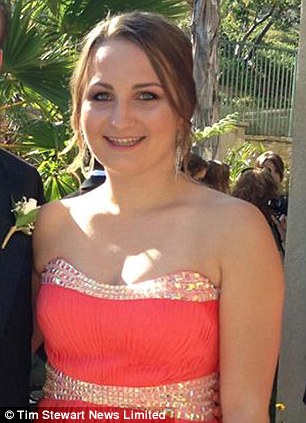
Redefining Masculinity
I have been routinely accused – often by these very same Asian American misogynists – of having a problem with Asian American men. Let me be clear: I don’t have a problem with Asian American men. I firmly believe in the political uplift of Asian American men, and the dismantling of institutionalized Asian American emasculation.
I just think that our definition of masculinity – specifically, our uncritical embrace of mainstream misogylinity – is flawed.
Misogylinity – masculinity defined by sexual conquest, or what the seduction community calls the “game” – is fundamentally misogynist; it is also heterosexist and racist. It fails to critically challenge racist stereotypes, including those that posit Black men as hypersexual and Asian American men as asexual. Individual, straight men of colour might achieve a modicum of masculine success by playing this “game” and repositioning themselves towards the center (defined by normative Whiteness), but this doesn’t challenge the fundamental stereotypes upon which the entire misogylinist “game” is built. Even if some Asian American win, all Asian American men still lose because the “game” is fundamentally rigged against us.
The solution that brings actual uplift of Asian American men – and all men of colour – is to stop playing. It is to change the rules.
Over the weekend I had a long conversation with one of the most important men in my life on this topic: Snoopy Jenkins (@SnoopyJenkins). As a man of colour whom I respect (although to be fair I’m biased), he defines masculinity by specific character traits: honour, self-respect, self-confidence, assertiveness, drive, protectiveness of those one loves. Masculinity is the creation of a personal moral code and living by those principles. Masculinity is fatherhood, friendship, respect, and love.
(Note: This is not to say that these traits cannot also define femininity; society’s persistent embrace of a bipolar definition of gender – masculine vs feminine – is an interesting topic that deserves its own space.)

More fundamentally, what distinguishes masculinity from misogylinity is that the former is defined by a man’s relationship to himself, whereas the latter is defined by a man’s relationship to others – women and other men.
This is a version of masculinity that I think all of us can get down with; or rather, one that we must get down with. It doesn’t posit the masculine aspiration as the athletic, straight, White man, and challenge men of marginalized identities – gay, men of colour, etc – to pursue an ideal they could never fully achieve (nor should they really want to). It further doesn’t objectify and commodify women, by appropriating our sexuality for the purposes of keeping masculine score.
This positive and empowered masculinity is gaining traction: it is central, for example, to The Good Men Project and Hyphen Magazine’s Mr. Hyphen pageant. I love to quote this interview with Sean Miura, Mr. Hyphen of 2013, where he defines his masculinity thusly:
“I know a lot of people who are like ‘we need more Daniel Dae Kims and sexy built dudes’ and I’m just ‘yeah, that would be great, but I also think we need more nerdy guys who are totally funny and able to hold their own, and I also think that we need more guys who are super athletic, and we need more super fierce queer Asian American men on stage,” he says. “When we branch out of the mainstream idea of ‘this is what a guy should be’ and look more into human beings being as they are, the moment we’re able to be ok with that, that would be awesome.”
Exactly.
For far too long, the Asian American community has sought to uplift Asian American masculinity without truly exploring what we mean by this. Friday evening’s tragic mass shooting at UC Santa Barbara was deplorable, but if we are determined to learn something from it, I hope one of the things we can do is finally examine America’s overtly narrow, and flawed, definition of masculinity, and our own problematic pursuit of it.
We must stop trying to win the zero-sum misogylinity “game”. We must reject it.
We must work to redefine our community’s entire concept of masculinity so that it reflects important character traits – self-assurance, honour, integrity, intelligence and respect; traits that I believe many Asian American men already possess in spades; traits that I believe truly define manhood.
And, as for Elliot Rodger? I’ve already spent far too much time in his ugly, twisted little world; more time than that man ever deserved. I look forward to soon forgetting his name.
Read More:
- Jeff Yang (@originalspin) blogs about Elliot Rodger’s internalization of White supremacy and masculine ideals at Quartz.
- Grace Hwang Lynch (@hapamamagrace) discusses Rodger’s biracial identity at BlogHer.
- Emil Guillermo (@emilamok) similarly talks Rodger’s racial identity at AALDEF.
- Ravi Chandra (@going2peace) discusses the mental illness of Elliot Rodger at Psychology Today.
- Arthur Chu (@arthur_affect) writes about rape culture and nerd culture at The Daily Beast.
- Marjorie Liu (@marjoriemliu) writes about how feminism is our superpower.
- Kristina Wong (@mskristinawong) writes about what the Isla Vista shooting means for the world our children will inherit, at XOJane.
Many Thanks: Jeff Yang (@originalspin), N’jaila Rhee (@blasianbytch), Oliver Wang, and SnoopyJenkins (@snoopyjenkins) for engaging in enlightening conversation with me to help organize my thoughts for this piece.
